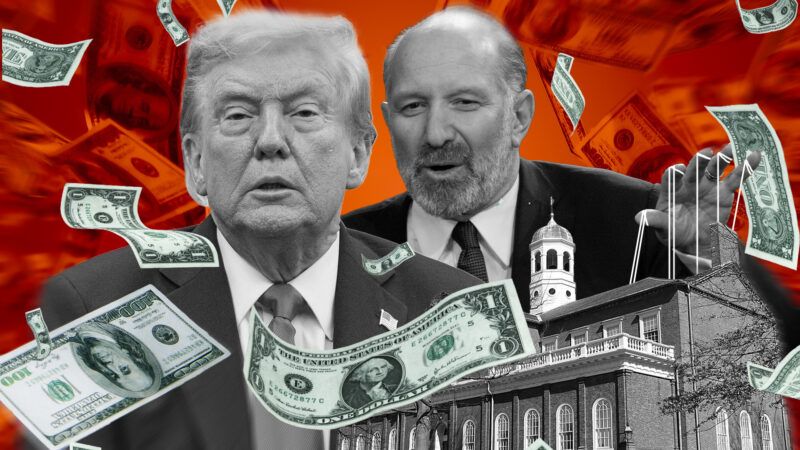Federal Funding for Universities Comes With Strings. Now Trump Is Pulling Them.
The potential nationalization and forced revenue sharing of university patents makes a strong case for the separation of economy and state.

Not satiated by siphoning revenue from Nvidia's and Advanced Micro Devices' chip exports and owning 10 percent of Intel, the federal government is now looking to get a cut of the royalties generated by university patents. Commerce Secretary Howard Lutnick proclaimed, "We are going to make a deal with them all" during a Tuesday Cabinet meeting.
"We have given tens, if not hundreds of billions of dollars to universities for them to do research," Lutnick said. A cursory investigation reveals that the federal government provided universities with about $60 billion for research and development in 2023. "If we give [the universities] the money, don't you think it's fair that the United States of America and the taxpayers who funded it, get a piece" of the revenue generated from patented technology?
Earlier this month, Lutnick sent Harvard University a letter demanding that it prove compliance with the Bayh-Dole Act, which allows universities to patent technologies that were developed with federal funding, by September 5. The letter invoked the act's march-in rights, which allow the federal government to seize control of these patents, even years after a technology has been developed. The government has never exercised the right, per Bloomberg Law. Stephen Ezell, vice president for global innovation policy at the Information Technology and Innovation Foundation (ITIF), tells Reason that exercising march-in rights would "decimate the intent of Bayh-Dole" because "companies would not engage with universities in licensing technologies in the first place if they were aware that the risk to their investments would be extremely high."
Bayh-Dole's stated purpose is to "promote the utilization of inventions arising from federally supported research or development." Before the act, the government owned every invention resulting from federally subsidized research. "They had 28,000 inventions, only 5 percent were licensed, and very few of them were ever commercialized," says Joe Allen, executive director of the Bayh-Dole Coalition and a former staffer to the bill's author, the late Sen. Birch Bayh (D–Ind.). In the two decades that followed the act's passage, "American universities experienced a tenfold increase in their patents and created more than 2,200 companies to exploit their technology," according to ITIF.
Lutnick questioning if the Trump administration should "get a piece" of these patents' royalties is rhetorically powerful but economically illiterate: The federal government receives revenue from these patents in the form of corporate taxes paid by the businesses that bring the technology to market, the income taxes paid by their employees, and the sales tax paid by consumers who purchase the product. U.S. universities contributed $1.9 trillion to U.S. gross industrial output from 1996 to 2020 thanks to academic technology transfers facilitated by the Bayh-Dole Act, according to ITIF.
The universities themselves do not charge exorbitant royalties, but "typically…charge a 2 percent royalty on a life science invention," says Allen. Moreover, Bayh-Dole restricts the use of these royalties to three things: "It's not being used to buy the university president a brand new car….It's to pay your costs, reward your inventors, and fund new research." Allen says that, "in 45 years, Bayh-Dole did not create any bureaucracy and it did not incur any additional costs on the taxpayers."
Ezell warns that government involvement in licensing details would "lead to massive delays and needless bureaucracy." Allen confirms Ezell's concerns, telling Reason that a royalty sharing provision was eliminated "after we sent the bill through the Judiciary Committee [because] a number of agencies [said] 'listen, we don't want to do this royalty sharing thing because it's going to cost more money to monitor the university licenses than we're going to get money out of it." It's unclear how Lutnick could force universities to share royalty revenue, but his "off-the-cuff pronouncements [are] shaking confidence in the system," according to Allen.
Lutnick's use of Bayh-Dole against its original purpose shows that public dollars always come with political strings attached. The Trump administration has also used the government's funding power to pressure other universities—like Columbia and Harvard—to implement changes to their admissions and hiring practices and institute stricter protections against antisemitism.
Getting the government involved in subsidizing higher education was always a Faustian bargain. The Bayh-Dole Act may have supported the tenfold increase in university patents in the two decades following its passage, but it did so at the expense of attaching government strings to academic research. It should come as no surprise that the Trump administration is now tugging on them to cow academia into compliance with its political agenda.


Show Comments (12)